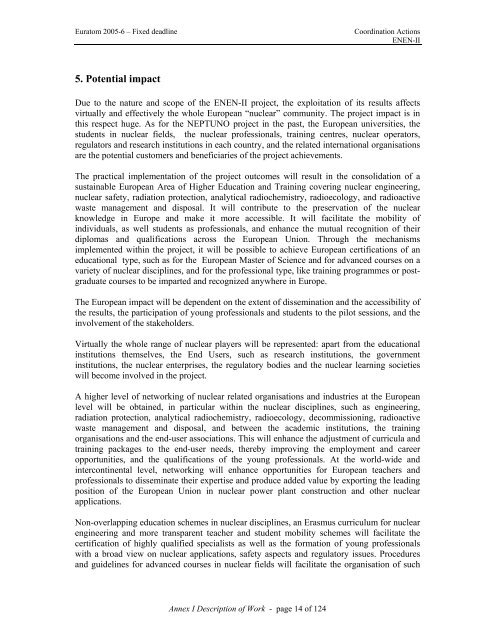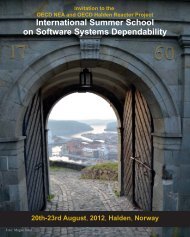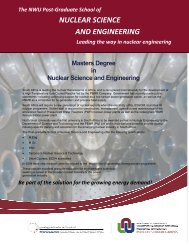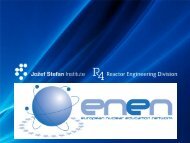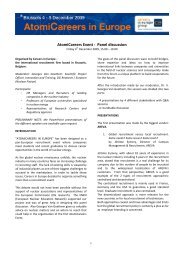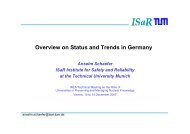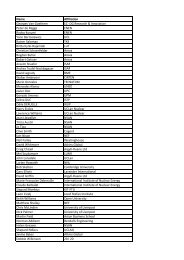Annex I Description of Work (April 2007) - ENEN Association
Annex I Description of Work (April 2007) - ENEN Association
Annex I Description of Work (April 2007) - ENEN Association
- No tags were found...
You also want an ePaper? Increase the reach of your titles
YUMPU automatically turns print PDFs into web optimized ePapers that Google loves.
Euratom 2005-6 – Fixed deadline<br />
Coordination Actions<br />
<strong>ENEN</strong>-II<br />
5. Potential impact<br />
Due to the nature and scope <strong>of</strong> the <strong>ENEN</strong>-II project, the exploitation <strong>of</strong> its results affects<br />
virtually and effectively the whole European “nuclear” community. The project impact is in<br />
this respect huge. As for the NEPTUNO project in the past, the European universities, the<br />
students in nuclear fields, the nuclear pr<strong>of</strong>essionals, training centres, nuclear operators,<br />
regulators and research institutions in each country, and the related international organisations<br />
are the potential customers and beneficiaries <strong>of</strong> the project achievements.<br />
The practical implementation <strong>of</strong> the project outcomes will result in the consolidation <strong>of</strong> a<br />
sustainable European Area <strong>of</strong> Higher Education and Training covering nuclear engineering,<br />
nuclear safety, radiation protection, analytical radiochemistry, radioecology, and radioactive<br />
waste management and disposal. It will contribute to the preservation <strong>of</strong> the nuclear<br />
knowledge in Europe and make it more accessible. It will facilitate the mobility <strong>of</strong><br />
individuals, as well students as pr<strong>of</strong>essionals, and enhance the mutual recognition <strong>of</strong> their<br />
diplomas and qualifications across the European Union. Through the mechanisms<br />
implemented within the project, it will be possible to achieve European certifications <strong>of</strong> an<br />
educational type, such as for the European Master <strong>of</strong> Science and for advanced courses on a<br />
variety <strong>of</strong> nuclear disciplines, and for the pr<strong>of</strong>essional type, like training programmes or postgraduate<br />
courses to be imparted and recognized anywhere in Europe.<br />
The European impact will be dependent on the extent <strong>of</strong> dissemination and the accessibility <strong>of</strong><br />
the results, the participation <strong>of</strong> young pr<strong>of</strong>essionals and students to the pilot sessions, and the<br />
involvement <strong>of</strong> the stakeholders.<br />
Virtually the whole range <strong>of</strong> nuclear players will be represented: apart from the educational<br />
institutions themselves, the End Users, such as research institutions, the government<br />
institutions, the nuclear enterprises, the regulatory bodies and the nuclear learning societies<br />
will become involved in the project.<br />
A higher level <strong>of</strong> networking <strong>of</strong> nuclear related organisations and industries at the European<br />
level will be obtained, in particular within the nuclear disciplines, such as engineering,<br />
radiation protection, analytical radiochemistry, radioecology, decommissioning, radioactive<br />
waste management and disposal, and between the academic institutions, the training<br />
organisations and the end-user associations. This will enhance the adjustment <strong>of</strong> curricula and<br />
training packages to the end-user needs, thereby improving the employment and career<br />
opportunities, and the qualifications <strong>of</strong> the young pr<strong>of</strong>essionals. At the world-wide and<br />
intercontinental level, networking will enhance opportunities for European teachers and<br />
pr<strong>of</strong>essionals to disseminate their expertise and produce added value by exporting the leading<br />
position <strong>of</strong> the European Union in nuclear power plant construction and other nuclear<br />
applications.<br />
Non-overlapping education schemes in nuclear disciplines, an Erasmus curriculum for nuclear<br />
engineering and more transparent teacher and student mobility schemes will facilitate the<br />
certification <strong>of</strong> highly qualified specialists as well as the formation <strong>of</strong> young pr<strong>of</strong>essionals<br />
with a broad view on nuclear applications, safety aspects and regulatory issues. Procedures<br />
and guidelines for advanced courses in nuclear fields will facilitate the organisation <strong>of</strong> such<br />
<strong>Annex</strong> I <strong>Description</strong> <strong>of</strong> <strong>Work</strong> - page 14 <strong>of</strong> 124


